Charlotte DUI-DWI Lawyer, North Carolina
Sponsored Law Firm
-
 x
x

Click For More Info:
-
George E Gibbs Jr. Attorney at Law
Matthews, NC 28105» view mapCriminal Defense Mathews Criminal Defense Attorney
George has experience with a variety of criminal and traffic offenses in North Carolina and can help you with your matter today.
800-319-3560
Samuel J. Randall
✓ VERIFIEDCriminal, DUI-DWI, Misdemeanor, Felony, White Collar Crime
Since 1998, Samuel J. Randall, IV has built a solid reputation among his peers, adversaries, and the judiciary in North Carolina as an aggressive and ... (more)
Kirk Robert Lundell
✓ VERIFIEDDivorce & Family Law, Child Custody, Employment, Criminal, DUI-DWI
Following a successful 15-year career managing several well-known retail stores throughout the country, Mr. Lundell decided to refocus his passion for... (more)
FREE CONSULTATION
CONTACTFREE CONSULTATION
CONTACT George Gibbs Matthews, NC
George Gibbs Matthews, NC AboutGeorge E Gibbs Jr. Attorney at Law
AboutGeorge E Gibbs Jr. Attorney at Law Practice AreasSpecializations
Practice AreasSpecializations


